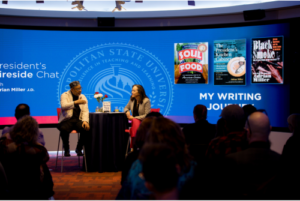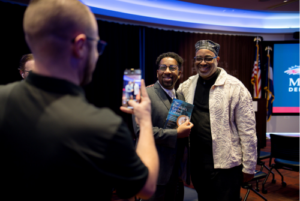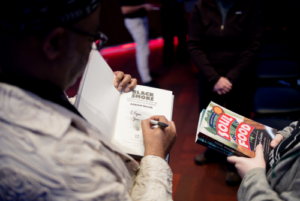
American food historian Adrian Miller on Tuesday emphasized the significance of relationships and connections as he recounted his journey from lawyer and public-policy advisor to food writer and two-time James Beard Award winner.
During Tuesday’s Fireside Chat with Metropolitan State University of Denver President Janine Davidson, Ph.D., Miller delved into going the extra mile, the transformative power of kindness and the role of storytelling and dialogue in building bridges to foster positive change.
He underscored how being kind, doing the work and sharing one’s dreams propelled him from practicing law in Denver to serving as a public-policy advisor for The Initiative for One America alongside former President Bill Clinton. Eventually, this journey led him to become a nationally renowned food historian and writer.

Miller addressed the intersection of connections, diversity and the absence of a cohesive culinary identity in Denver. He highlighted the influence of American cookery, emphasizing the strong foundations in Southern comfort food and immigrant cuisines. There is a pressing need to encourage diversity in food storytelling, he said, adding that only by embracing a diverse range of narratives can culinary writers and consumers gain a comprehensive understanding of the true essence of American cuisine.
He reiterated the significance of connections, emphasizing how the quality of food is inherently linked to the accompanying hospitality and service. Drawing on his role as the chair of the National Restaurant and Chef Committee for the James Beard Awards, he highlighted the critical importance of excellent service and the impact of the “wow factor” in hospitality. He noted there’s a James Beard Award for outstanding hospitality, underscoring how service contributes significantly to the overall dining experience.
Miller touched on the need for Denver’s culinary scene to establish roots unique to the city, rather than being influenced solely by regional variations. He proposed a dialogue on standards to foster this distinctive identity. Miller emphasized the role of future hospitality students in shaping this narrative and highlighted the collective responsibility to amplify the voices of diverse restaurants within the city.
 Miller’s journey into food history and writing began with the discovery of a cookbook in a Denver bookstore. Inspired by a quote in the book, he started the process of chronicling the history of soul food and its far-reaching impact on American cookery.
Miller’s journey into food history and writing began with the discovery of a cookbook in a Denver bookstore. Inspired by a quote in the book, he started the process of chronicling the history of soul food and its far-reaching impact on American cookery.
He further delved into his belief in openly sharing one’s dreams, stressing the importance of reigniting interest in public service, advocating for support to small businesses and reflecting on the impact of gentrification on the culinary scene. Miller passionately addressed the essence of soul food and its origins and drew from his personal experiences as a soul-food writer from Denver.
If you missed the event, watch the recording available on the President’s Fireside Chat webpage.

